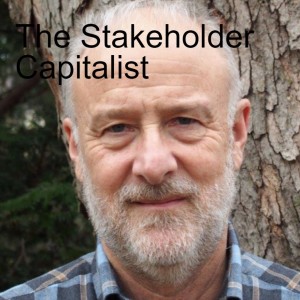
Monday Oct 02, 2023
Stakeholder Capitalism Update
In March 2022, the Enterprise Engagement Alliance featured a YouTube show with three leaders in the Stakeholder Capitalism and related ESG (Environmental, Social, Governance) to assess the state of the movement. Now 18 months later, we bring back two of the three panelists to share their views of the future and their views haven’t changed: the shift to a stakeholder mindset is inevitable but will take many forms. How much has changed in the state of stakeholder capitalism and the related issues of ESG over the last 18 months since the beginning of the “anti-woke” campaign?
To find out, we turned to R. Edward Freeman, author of the seminal 1984 book, Strategic Management--A Stakeholder Approach, and Martin Whittaker, CEO of JUST Capital, an authority on corporate stakeholder performance. They were panelists on the March 2022 program. Summary of findings: The roots of Stakeholder Capitalism. According to R. Edward Freeman, he wrote his 1984 book "Strategic Management, a Stakeholder Approach," based on a desire to better understand how business works. He never thought of it as an ideology but rather a system to improve business by harmonizing the interests of stakeholders toward a clear purpose. “Clearly business can be a force of good,” he emphasizes.
1. What is the status of the anti-woke movement in terms of stakeholder capitalism and ESG implementation in the US and overseas? Martin Whittaker believes the distorted definition of stakeholder capitalism is simply being used by candidates to get attention and that it is not slowing down efforts by companies to look more strategically at how they create value through stakeholders. In fact, the largest number of corporations ever engaged in a pre-release review of the organization’s Just 1000 rankings this year, demonstrating the heightened interest in the subject. (When the Good Company Index by McBassi Inc. attempted a similar type of ranking process in the 2000s, it was never able to get many companies to respond. The index was used by the Enterprise Engagement Alliance to create a mock Engaged Company Stock Index that outperformed the S&P 500 by over 38% over six years.) Whittaker notes that the Strive Asset Management so-called anti-Stakeholder Capitalism investment fund, which recently topped $1 billion in holdings thanks in part to its former owner Vivek Ramaswamy’s presidential candidacy, holds many stocks in the Just Capital top 1000. (Some observers explain this by observing that Strive is essentially a vehicle for undermining ESG efforts in proxy fights.)
2. Do business leaders or the public generally understand the distinction between the rhetoric and practical application of a process to enhance the enterprise and stakeholder experiences. The panelists agree that management is showing a greater interest in stakeholder thinking but admit that silos and a lack of understanding of the relationships between different stakeholders remain major impediments. Freeman underlines that one of the prime obstacles is the continued belief that “it is all about the money in business, when clearly that is not the case.”
3. Do businesses lack formal expertise to move from talk to action? The panelists observe that it’s an organic process based on each organization, and that there is no one system. Whittaker notes that beyond having a general framework based on evaluating an organization’s commitment to the people investments most valued by Americans analyzed by an ongoing survey—workers, customers, supply chain and distribution partners, the communities, and the environment—each organization will find its own way. The process, says Whittaker, starts with a gap analysis, and the determination of where to start. The panelists agree that organizations don’t have to take on the entire process at one time. Based on his experience working with thousands of managers, Freeman is convinced that companies are beginning to lean into stakeholder thinking and both agree that it starts with listening to stakeholders. To Freeman, “it would be a good idea, for instance, if human resources had a better understanding not only of the welfare of employees but of the stakeholders they affect.”
4. What is the potential impact of the European Union Corporate Sustainability Reporting Directive? The panelists agree that the overall attention the law will place on stakeholder thinking and the requirement to make specific disclosures will have a positive impact on what both believe is the inevitable push toward more focus on harmonizing the interests of stakeholders and greater transparency. To Contact the Speakers/Host Martin Whittaker, CEO Just Capital at https://Justcapital.com, mwhittaker@justcapital.com R. Edward Freeman, Professor Darden School of Business, University of Virginiafreemane@darden.virginia.edu Bruce Bolger, Founder, The EEA at https://TheEEA.orgBolger@TheEEA.org
No comments yet. Be the first to say something!